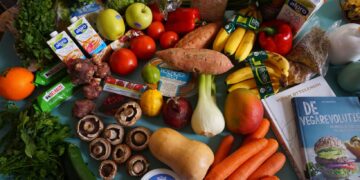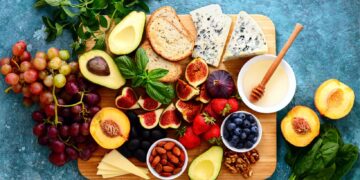As we age, maintaining good nutrition becomes increasingly important for our overall health and well-being. A well-balanced diet can help seniors combat age-related conditions, boost their immune system, and maintain a high quality of life. In this guide, we will explore the essential elements of a senior’s diet, highlighting key nutrients, meal planning strategies, healthy eating habits, and additional considerations to promote optimal health and vitality.
The Power of Nutrient-Rich Foods
Essential Nutrients for Seniors
- Protein: Promotes muscle strength and repair, which can help prevent muscle loss and frailty. Good sources include lean meats like chicken and turkey, fish, eggs, dairy products, and legumes like beans and lentils.
- Calcium and Vitamin D: Supports bone health and reduces the risk of osteoporosis. Calcium-rich foods include dairy products, such as milk, cheese, and yogurt, as well as fortified plant-based milk alternatives. Vitamin D can be obtained from sunlight exposure or through foods like fatty fish (salmon, mackerel), egg yolks, and fortified cereals.
- Fiber: Aids digestion, prevents constipation, and helps maintain a healthy weight. Include plenty of fruits, vegetables, whole grains (oats, whole wheat bread), and legumes (chickpeas, black beans) in your diet.
- Omega-3 Fatty Acids: Supports brain health, reduces inflammation, and may help lower the risk of heart disease. Good sources include fatty fish (salmon, sardines, trout), flaxseeds, chia seeds, and walnuts.
- Vitamin B12: Essential for nerve function, energy production, and the formation of red blood cells. As we age, it may become more challenging to absorb vitamin B12 from food, so consider fortified cereals, dairy products, or talk to your doctor about supplements.
Superfoods for Seniors
- Blueberries: Packed with antioxidants that combat age-related cognitive decline and promote brain health.
- Spinach: Rich in vitamins A, C, and K, as well as iron and calcium, supporting bone health, cognitive function, and overall vitality.
- Nuts and seeds: Provide healthy fats, fiber, and essential minerals like magnesium and selenium. Almonds, walnuts, flaxseeds, and chia seeds are great options.
- Greek yogurt: High in protein, calcium, and probiotics, promoting gut health, bone strength, and aiding digestion.
- Turmeric: Contains curcumin, which has potent anti-inflammatory and antioxidant properties. It may help reduce the risk of chronic diseases such as heart disease and arthritis.

Practical Tips for Meal Planning
Portion Control
- Opt for smaller, more frequent meals to maintain energy levels throughout the day and avoid feeling overly full.
- Use smaller plates and bowls to control portion sizes and avoid overeating.
- Fill half of your plate with non-starchy vegetables like broccoli, cauliflower, leafy greens, or peppers. One-quarter should be lean protein sources such as grilled chicken, fish, or tofu. The remaining one-quarter can be whole grains like brown rice, quinoa, or sweet potatoes.
- Hydration:
- Drink plenty of water throughout the day to stay hydrated, aid digestion, and maintain overall bodily functions.
- Limit sugary beverages like soda and fruit juices, and opt for herbal tea, infused water, or low-sodium broth for added hydration.
Cooking Methods
Choose healthier cooking methods such as baking, grilling, steaming, or sautéing instead of deep-frying Emphasize Variety and Color:
- Aim to include a wide variety of colorful fruits and vegetables in your meals. Different colors indicate different beneficial nutrients.
- Incorporate leafy greens like kale, spinach, and Swiss chard for their high nutrient content.
- Include a mix of vegetables such as carrots, bell peppers, tomatoes, and broccoli to maximize nutrient intake.
Mindful Snacking
Opt for nutritious snacks like fresh fruit, yogurt, raw nuts, or vegetable sticks with hummus. Be mindful of portion sizes when snacking and avoid mindless munching in front of the television.
Healthy Eating Habits
Slow and Mindful Eating
- Take your time to chew food thoroughly, savoring each bite. This aids digestion and helps prevent overeating.
- Pay attention to hunger and fullness cues. Stop eating when you feel satisfied, not overly full.
Socialize and Share Meals
- Eating with others promotes social interaction, improves mood, and can help prevent feelings of loneliness or isolation.
- Join community meal programs, organize potlucks, or invite friends and family for regular meals together.
Be Flexible
- Allow yourself the occasional indulgence, but maintain a predominantly healthy and balanced diet.
- Listen to your body’s hunger and fullness cues to avoid unnecessary snacking or overeating.
Future Planning: Understanding ALTCS
For seniors, it’s essential to plan not only for their nutritional needs but also for their future long-term care expenses.One important consideration is understanding the Arizona Long-Term Care System (ALTCS), which provides Medicaid coverage for eligible individuals who require long-term care services. Seniors can take proactive steps to ensure they meet the eligibility criteria and navigate the application process by consulting with ALTCS specialists or elder law attorneys.

These professionals can help assess financial qualifications, develop asset protection strategies, and guide seniors through the necessary paperwork.By staying informed and proactive, seniors can have a better understanding of the resources available through ALTCS and make informed decisions about their long-term care needs.
Considerations for Specific Health Conditions
- For individuals with diabetes, it is important to monitor carbohydrate intake and choose complex carbs like whole grains, legumes, and non-starchy vegetables. Consult with a registered dietitian for personalized guidance.
- Seniors with specific dietary restrictions or health conditions should work closely with healthcare professionals or registered dietitians to develop meal plans tailored to their needs.
Conclusion
By prioritizing proper nutrition, seniors can enjoy a higher quality of life, maintain independence, and reduce the risk of age-related diseases. A well-balanced diet, rich in essential nutrients and superfoods, combined with practical meal planning strategies and healthy eating habits, can contribute to overall well-being and longevity. Remember, it’s never too late to start eating well and reaping the benefits of nutritional excellence in your golden years. Consult with healthcare professionals or registered dietitians for personalized advice and guidance on your specific nutritional needs.













